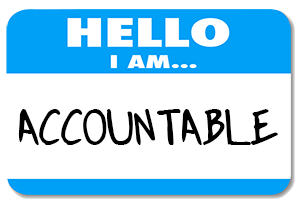These three terms are almost always confused, interchanged and usually poorly understood. In a recent interview about scaling businesses with Verne Harnish we talked through the differences between Accountability, Responsibility and Authority in some detail. Here’s that info in more detail.

What some other ‘experts’ say
There are plenty of examples which conflict with each other and that I believe are completely incorrect and in a lot of cases the definitions totally conflict with themselves:
- Paul Gillard, PhD & Rachel Radwinsky, PhD here think to be accountable is to be held culpable for your actions, even that “If you are responsible for something, you are also accountable”. Below we argue that only one person should be accountable but not why you think
- Consultant Sam Harrop here says that being accountable means that you have responsibility for the results. So along the same lines, if I had responsibility but was not accountable then the quality of the work is someone elses problem? Seems hard to argue.
- The guys at Blue pea pod here seem to have responsibility right but define accountability as ownership of an outcome. I’d argue that ownership of an outcome is responsibility (see great video below)
- Finally I found this article from the tomorrow lab that states that being accountable means that you are ‘liable or answerable’ for your actions. Again I’d say that this is confusing responsibility and accountability.
I don’t mention these examples to particularly call them out, just to say that the words are almost always incorrectly defined.
Accountability
What is it?
 First lets split this word in its two parts: Account|ability
First lets split this word in its two parts: Account|ability
Account – “A report or description of an event or experience” – Oxford dictionary
Ability – “Possession of the means or skill to do something” – Oxford dictionary
So combined ‘Accountability’ is literally the ability to report on events or experiences. This is the responsibility (in the sense defined below) to monitor, i.e. to count. The job of being accountable for something should be assigned to a single individual who’s duty it is to monitor a specific task, process, service or KPI.
Why only one person?
Just to be 100% clear, only one person should be accountable per task, process, service or KPI. If you have more than one person who is accountable then each person will assume that the other is keeping count and most cases this will lead to nobody keeping count.
With one person accountable for something it’s their job to keep an eagle eye on it.
How is it misunderstood?
One of the most common mistakes is to believe that this means that the person who is accountable is the person who will be blamed if things go wrong (These are called consequences). In common culture it’s mistaken as “an unspoken desire for more consequences (i.e., reward for achievement and punishment for failure)”.
Where does the confusion arise from?
Well popular media, politicians and journalists. Using the phrase “I take complete accountability” within the context that they are willing to accept the consequences of their poor decisions.
“We talk about it to give it voice. The person accountable is not boss doesn’t mean they know it all, do it all. You know almost any decision in the world, it’s better if you get a lot of peoples input.
But their job is to scream, and scream and scream loud. If something’s going wrong.” @TheGrowthGuy
Example
A software business has a ticket system to monitor support queries. Jenny is accountable for the support queue length and the average time it takes to resolve a ticket. If the queue goes over a certain length or ticket response time goes down she must let those who have responsibility (probably the support manager or her boss) know.
Lets think about that. Jenny is ‘accountable’ that means she has to monitor the queue. I’ve seen this in organisations where either there is no definition of who is accountable or if there are multiple people, it doesn’t work. It has to be one person.
Responsibility
What is it?
This is the duty and ability to respond or take action. Giving someone responsibility for a task, task, process, service or KPI means that it is the role of that person(s) to do the task. It can be assigned to multiple people.
This great video from Active Nation covers it off responsibility very nicely
How is it misunderstood?
Actually this one isn’t too bad. Most people get it. If you’re responsible for doing something and you don’t then you’ve failed.
Example
Following the example of the software company. It is the responsibility of the support agents to respond to the support tickets.
Note you might need authority to respond, see below..
Authority
What is it?
This one is pretty easy, it’s “the power or right to give orders or make decisions”. Many people can have it and usually there’s someone at the top, the CEO/board of directors or shareholder who has/have the highest level of authority.
How is it misunderstood?
This one is usually crystal clear. However, some organisations do not clearly indicate who has/doesn’t have authority which can make taking decisions quite difficult.
Example
In the example of the software company support team, an agent might have the authority to change a users price plan but it’s possible only the duty manager has the authority to offer a refund.
